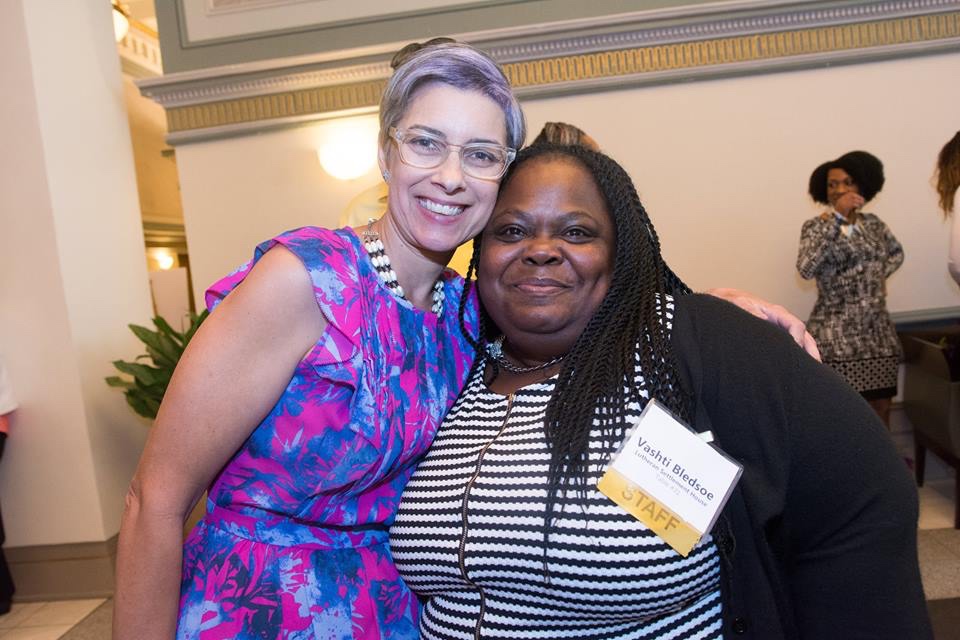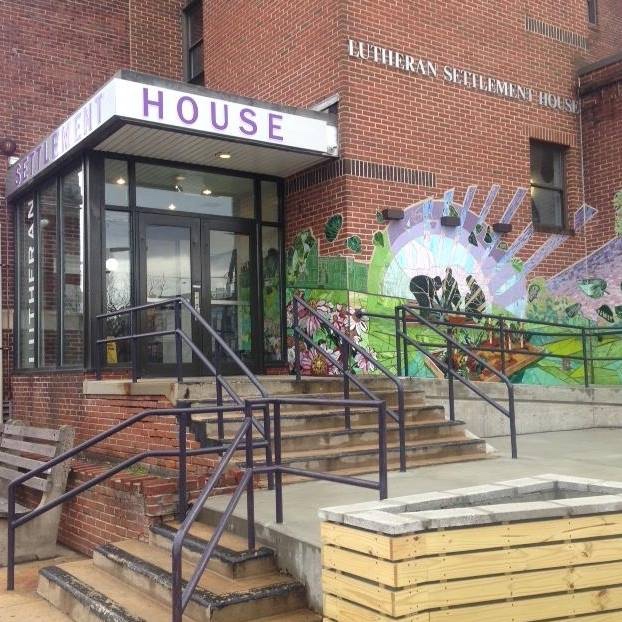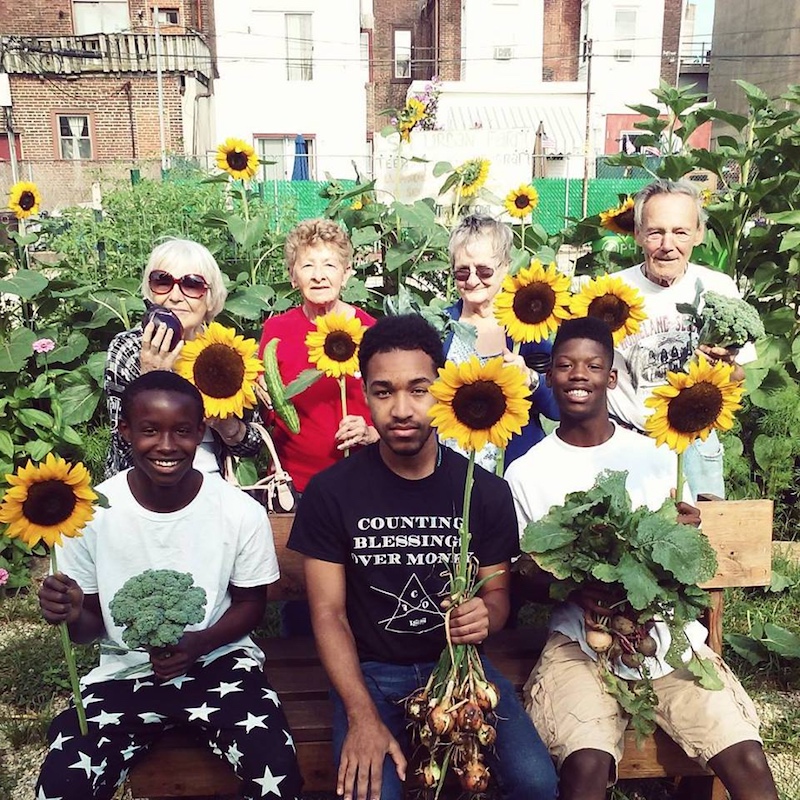Moving On: Lutheran Settlement House ED Kelly Davis
 July 25, 2016
Category: Column, Featured, Long, People
July 25, 2016
Category: Column, Featured, Long, People
Moving On is a series of Q&As with social impact leaders who are leaving their organizations for new opportunities. Here, they share what they learned and where they’re headed.
The new Fishtown isn’t all coffee shops and cool street art. Despite its growing reputation as a Mecca for the hip, the River Wards still have a 28 percent poverty rate — two percent higher than the city’s average.
That’s where Lutheran Settlement House comes in. The 114-year-old nonprofit, which operates a senior center on the rapidly changing Frankford Avenue and a family homeless shelter in West Philadelphia, boasts an adult literacy program, a bilingual domestic violence program, an intergenerational farm and other services for the area’s most vulnerable.
During her five-year tenure as executive director, Kelly Davis oversaw the fundraising and construction of LSH’s main site and the expansion of the org’s food cupboard from serving once a month to every day. In her Moving On interview, Davis talked with Generocity Editor Julie Zeglen on her last day about how she’s seen LSH’s mission shift during her tenure and what she’s learned about effective leadership. Their conversation has been edited for length and clarity.
Generocity: First things first — why are you leaving?
Kelly Davis: I’ve been here for five full years, and it’s a very demanding job in a very demanding sector, and we had just finished our building project and we were gearing up for another major project. This seemed to be a good time to take care of myself and my family. My kids are 12 and 10, and I wanted to be more present for them and just take a little bit of a breather.
G: How did you first come to work with Lutheran Settlement House and what was your role as the executive director?
KD: I first came as a board member. I was on the board for a year, and we needed an interim ED. I found it suited many of my skills, and that turned into a permanent position.
I had never expected to be in this role, and it’s been an incredible journey. I have been responsible for 65 employees. And, the first thing that I faced was, we had very little money. We went right into fundraising mode and we’ve been very successful at growing the agency. We’ve been in surplus since we’ve started. We’ve been able to do the $1.5 million building project [of LSH’s main site], triple the growing space of our farm by getting the city to donate lots to us, and grow our domestic violence hospital program. We started trauma therapy. We started an after-school program.
We are a large octopus with many legs, and it’s really exhausting to manage all those legs.
G: What was that $1.5 million building project like?
KD: I used to work in a prison as a public defender, and [the original building] really looked like a prison to me. You couldn’t see through the front door, there was yellow plastic and bars on all the windows, and there were vending machines blocking the front entryway. And I thought to myself, “We really need to redo this foyer.” The community is changing, and we want people to feel welcome to volunteer, donate and exchange services.
And then a few months later, out of the blue, was this letter from the state government saying that we had an existing grant for $500,000. It turns out, we had gotten it two executive directors ago, and it was for a state RACP [Redevelopment Assistance Capital Program] grant, which comes with a million strings. You need to match to money, so it has to be at least a million-dollar project. So, it took us that long to raise the other $500,000 — we raised more than that — and to hire architects, get the lot across the street so we could move the parking lot from where the front entryway is now. We really wanted to be a part of the neighborhood, and it had this suburban mini-mall feel before that. It didn’t feel like Frankford Avenue.
G: What was the timeline and when the project was completed?
KD: It was completed last November. It started four and a half years ago. It actually started like, 15 years ago, when that grant was initially received.
G: You mentioned also that when you first started, there wasn’t much money, and now there’s a surplus of money and LSH has these big projects going on. What were the steps that you had to take, as the executive director and as an organization together, to get to the point where you were financially sound, you could grow at this scale, and you could complete these big projects?
KD: The way I see it is that the work that Lutheran Settlement House does is incredible — the value it adds to the community, the people that it takes care of every day in the shelter and the senior center. We needed somebody to come in and shine the work up and allow the city to know what we were doing. I think I was able to bring my skills as a public defender — persuading judges and juries why they should rule in my favor — to explaining the story of Lutheran Settlement House, and the clients and staff.
That’s 95 percent of it, for fundraising. [It’s also] getting new signage and fliers and telling people in this community, “Hey, there is a nonprofit right on this corner that is helping 200 people every day, and you should support them.”

Davis with Vashti Bledsoe, director of LSH’s Bilingual Domestic Violence Program. (Photo by Darryl Cobb Jr.)
G: In the newsletter LSH sent out in which you announced your departure, you mention some of the milestones from the last few years — for instance, the food cupboard is open daily instead of monthly.
KD: Oh my gosh, that completely shocked me when I first started, that we had a food cupboard but it was only open for a few hours once a month. I really couldn’t get over that. And we actually just looked at our Google Analytics, and we saw that “food cupboard” was the number one hit for our website by like, a factor of 10. So many people are coming to us for food, and the fact that we’ve been able to make ourselves available to the community — which, although it feels gentrified right on Frankford Avenue, there’s a tremendous amount of need all around it — and so to offer that resource to the community feels great to me. And the faces of hunger you see in our waiting room are real and true, and I’m so grateful that our staff has agreed to open up and serve that need.
G: That is an interesting point about its location, too, because I think if LSH were looking to settle nowadays, it would seem strange to put yourself on Frankford Ave, given all the other businesses that are popping up there, and who’s living in that neighborhood — or at least, the public perception of that area of Fishtown. But you’re serving people who do live in that community.
KD: Yeah. The Rivers Wards are a very impoverished neighborhood, and a very low-literacy neighborhood. One of the first things I did as ED was to lay off every single person in our adult education department, as the state had cut 80 percent of funding to Philadelphia, in the summer of 2011. So we laid everybody off and we rebooted with volunteers. Now, we have two paid people who we pay for with grants and donations. So, we don’t get any government funding, but we felt that it’s such an important service that we’ve met for so long that we do a lot with a little.
G: Has there been any shift in mission since you’ve been there, or since the organization’s beginnings?
KD: We’ve been around so long that there’s definitely been a shift. It’s always been to serve the most needy and most vulnerable. Where we once served immigrants, we now serve the great-grandkids of those immigrants. And, for whatever reason — the failings of the public schools, entrenched poverty — they can have very low literacy levels, so that’s who we’re serving now.
And then lots of the seniors in the senior center grew up coming to Lutheran Settlement House as kids and remember roller skating in our basement or doing Girl Scouts with us.
G: I remember that was [NKCDC Executive Director] Sandy Salzman’s story.
KD: She got her first job here. You wouldn’t believe how many social workers I’ve met who have said, “My first job was at Lutheran Settlement House!”
G: What is coming next for the leadership? Are you staying involved at all?
KD: Yeah, I’ll continue to provide support for another building project. [Editor’s note: Davis said she’s not allowed to talk about the specifics of that project, so no details yet.] I’ve been thinking about working the domestic violence hotline. But I definitely want to stay involved and stay supportive.
G: And is there a plan for who will succeed you in the position?
KD: We are accepting resumes and expecting they’re going to start interviewing pretty soon. (on website) For the incoming executive director, I would really encourage them to get as much formal leadership training as they can, because that was the hardest part for me. I did the NELI [Nonprofit Executive Leadership Institute] program at Bryn Mawr.
I’ve had an executive coach, and that’s been really helpful. But you can’t have enough support, because when you’re at the head, you’re alone. You don’t have anyone to go to that’s there day after day. It’s really challenging, and that can’t be overstated.
G: As you grew in the role, is there something about leadership that surprised you, or something else that you learned about being a director, once you’d been doing it for a while?
KD: All humans are different and special and challenged, and balancing that and yourself is incredibly hard, and you need to expect the unexpected and appreciate yourself and others as much as you can, and don’t be afraid to ask for support form your board or from your colleagues.
And the other thing I think is really important is always express the good and the challenges — to funders, your staff — because nothing is ever black and white. Everything is gray. And you seem more credible, and it always seemed more honest to me. I think that was one reason that funders trusted us, because we say how hard it is and how rewarding it is.
G: Is there anything else that you would like to share about your time at LSH or this transition, personally and for this organization?
KD: I’m just grateful for this experience and for what I’ve been able to contribute, and I know that it was around for 110 years before and it will be around for a long time after me, and I’m grateful for what being in this organization has taught me.
Project
Moving OnTrending News











